Overview
In the realm of PHP backend development, developers often face significant coding challenges that can hinder efficiency. How can these challenges be addressed effectively? This is where tools like Kodezi come into play, offering features that automate API documentation and streamline coding processes. Frameworks such as Symfony and Laravel already help in this regard, but Kodezi takes it a step further.
By automating tedious tasks, Kodezi not only saves time but also enhances code quality. Imagine the boost in productivity when developers can focus more on writing code rather than documenting it. Furthermore, the integration of Kodezi with existing frameworks allows for a seamless workflow, making it an essential tool for any PHP developer.
The benefits of using Kodezi are clear: improved productivity and higher code quality lead to better project outcomes. Are you ready to elevate your coding practices? Explore the tools available on the Kodezi platform and experience the difference for yourself. With the right tools at your disposal, coding can become a more efficient and enjoyable process.
Introduction
In a rapidly evolving digital landscape, developers encounter numerous challenges that demand efficient solutions to streamline backend processes. How can they effectively overcome these obstacles? The emergence of various frameworks has revolutionized PHP development, with tools like Kodezi stepping in to address these issues. Kodezi automates API documentation, allowing developers to focus on what truly matters—creating high-quality code. Furthermore, robust frameworks such as Symfony and Laravel offer unique advantages tailored to diverse project needs, enhancing productivity and code quality.
As developers navigate the complexities of modern web applications, understanding these tools and their integration with technologies like Node.js and Express.js becomes crucial. This article delves into the strengths of popular frameworks, compares their functionalities, and highlights the growing role of PHP in mobile development. By providing insights for developers aiming to optimize their workflow, we encourage you to explore the tools available on the Kodezi platform to deliver high-quality applications.
Kodezi | Professional OpenAPI Specification Generator - AI Dev-Tool: Streamline Your PHP Development Process
Developers often face significant challenges when it comes to managing API documentation. Kodezi stands out as a robust OpenAPI Specification generator that automates this process, allowing programmers to focus on coding rather than being bogged down by manual documentation tasks. This automation significantly enhances productivity within the framework PHP backend creation process, ensuring that APIs are not only well-documented but also adhere to industry standards. In fact, coding and programming APIs accounted for 29.5% of time allocation for API tasks in 2020. How much time could you save by streamlining this aspect of your workflow?
For programmers handling intricate applications, Kodezi simplifies API integration, resulting in faster creation cycles and improved code quality. Its suite of programming tools, including the Kodezi CLI, automates code reviews, keeps API documentation in sync with code modifications, and enhances security, making it an essential resource for teams. As Tajammul Pangarkar, CMO at Prudour Pvt Ltd, notes, the increasing global demand for API management solutions underscores the importance of tools like Kodezi in the current market landscape, especially when integrated with a framework PHP backend. With the growing trend toward automation in API documentation, Kodezi enables programmers to uphold high standards while effectively managing the requirements of contemporary web design. Furthermore, Kodezi's smooth code translation features, combined with the automatic creation and hosting of Swagger UI sites for API documentation and testing, further enhance overall development flexibility. What advantages could these features bring to your programming projects? Explore the tools available on the Kodezi platform to discover how they can transform your coding experience.
Symfony Framework: A Robust Solution for PHP Backend Development
In the realm of PHP development, Symfony emerges as a powerful and adaptable framework php backend, expertly designed to tackle the demands of complex projects. Its modular architecture enables developers to select only the necessary components, significantly enhancing performance and minimizing overhead. This thoughtful design philosophy not only streamlines the development process using the framework php backend but also adheres to best practices and coding standards, ensuring that applications remain maintainable and scalable in the long run.
With built-in tools for routing, templating, and security, Symfony serves as a powerful framework PHP backend that equips developers to efficiently create high-quality applications. Furthermore, the vibrant community surrounding the framework PHP backend Symfony fosters continuous improvement and support, making it a preferred choice among PHP developers.
Recent enhancements in 2025 have further boosted Symfony's performance, reinforcing its status as a premier framework PHP backend within the PHP ecosystem. Notably, statistics reveal that Symfony, a popular framework php backend, is utilized by over 30% of PHP developers, underscoring its popularity and effectiveness.
Real-world case studies illustrate how the framework PHP backend, Symfony, has markedly improved application performance, particularly in managing complex requirements, as demonstrated by a comparative study showcasing the superior capabilities of this framework PHP backend with intricate applications compared to Laravel.
As Shanika Wickramasinghe aptly notes, 'Laravel is a preferable choice if the framework is new to you, but it’s straightforward to learn and offers superior learning resources with a simplified syntax.' This perspective highlights the distinct advantages of Symfony for seasoned developers facing complex challenges.
Laravel Framework: Simplifying PHP Backend Development with Elegance
In the dynamic world of software development, coding challenges are an everyday reality for developers. How can these challenges be effectively addressed? As a framework php backend, Laravel stands out with its elegant syntax and expressive API, simplifying essential tasks like routing, authentication, and caching. The framework's Eloquent ORM offers a clear and user-friendly method for database interactions, while the Artisan command-line interface streamlines workflows by automating repetitive tasks.
Moreover, Laravel's built-in security features, including robust protections against SQL injection and cross-site request forgery, ensure that applications remain secure. As of 2025, the adoption rates of the framework php backend Laravel among PHP programmers continue to rise, driven by its ability to enhance development speed and efficiency. According to the Annual State of Laravel 2024 Survey, professionals with over five years of experience in Laravel can achieve income levels exceeding $120,000, especially in cities like San Francisco and London. This statistic underscores the financial advantages of mastering Laravel.
But how does Kodezi elevate this experience further? With its AI-driven functionalities, such as automatic code correction and bug analysis, Kodezi enhances Laravel's features, improving workflow efficiency and adaptability for programmers across various languages and IDEs. Kodezi CLI provides teams with a powerful tool to auto-heal codebases, allowing developers to focus on innovation instead of repetitive tasks.
In contrast to competitors like Copilot, Kodezi emphasizes an autocorrect approach to coding, enabling automatic debugging and resolution of coding issues. This not only boosts productivity but also enhances code quality.
Are you ready to transform your coding experience? Explore the tools available on the Kodezi platform and discover how they can enhance your development journey.
Django Framework: A Comparative Insight for PHP Developers
Django is a high-level Python web framework that facilitates quick creation and clean, pragmatic design. Developers often encounter challenges when selecting the right framework for PHP backend, especially when considering options like Laravel and Symfony. While these frameworks excel in their domains, Django stands out with its batteries-included approach, featuring built-in tools like an admin panel, ORM, and authentication system. This robust functionality can significantly accelerate progress for projects requiring a strong backend.
Furthermore, PHP programmers may find Django's emphasis on convention over configuration appealing. This approach not only encourages best practices but also minimizes boilerplate code, making the development process more efficient. Have you considered how adopting such conventions could streamline your own coding practices?
To enhance your coding skills and productivity while working with frameworks like Django or PHP, consider exploring Kodezi Code. This versatile tool is designed to boost programming efficiency, allowing you to focus on what truly matters—creating high-quality code. By integrating Kodezi into your workflow, you can experience improved productivity and better code quality. Why not take a moment to discover the tools available on the platform that can help you elevate your coding experience?
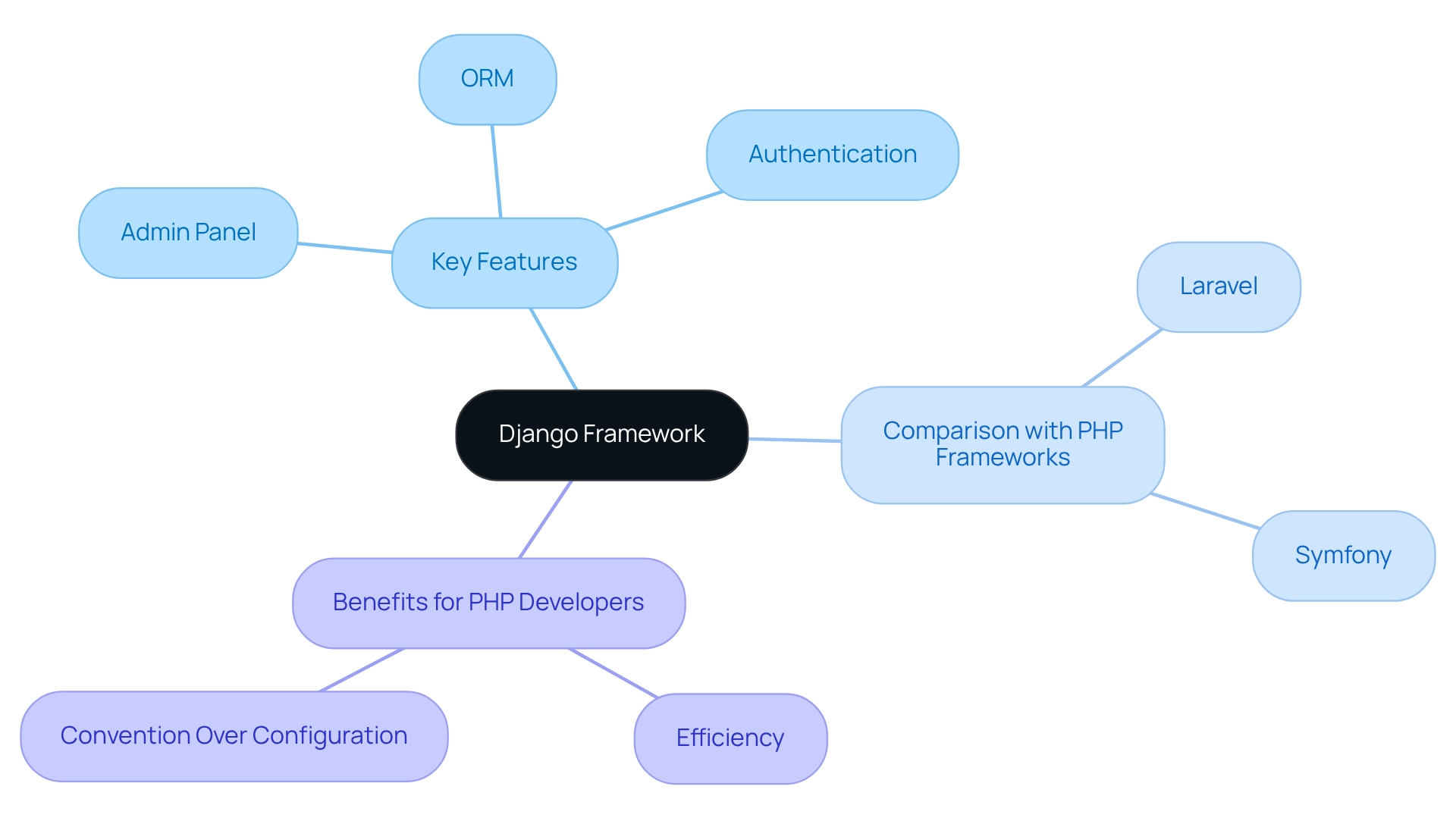
Node.js: Bridging PHP with JavaScript for Enhanced Backend Functionality
Node.js empowers programmers to leverage JavaScript on the server side, creating a unified full-stack development experience. By merging Node.js with the framework PHP backend, developers can leverage the distinct advantages of both languages. Node.js excels at managing asynchronous tasks and real-time applications, thanks to its non-blocking I/O model, which enhances performance and scalability by accommodating multiple connections simultaneously. In contrast, PHP remains a robust choice for traditional web development tasks. This synergy not only boosts software performance but also enhances scalability, establishing a potent strategy for contemporary web design.
Consider the principle of separation of concerns, which effectively segments applications into distinct modules. This methodology can be adeptly executed with Node.js in conjunction with PHP. Such an approach diminishes complexity while improving maintainability and code reusability, as illustrated by successful case studies in backend development that showcase superior code organization. As Pranjal Mehta, Managing Director, notes, "Having 10+ years of experience and clientele across the globe, he is always curious to stay ahead in the market by inculcating latest technologies and trends."
With more programmers recognizing these benefits, the integration of Node.js with framework PHP backend is expected to gain traction, further solidifying its role in effective backend solutions. The increasing popularity of Node.js among developers highlights its relevance, making it a timely consideration for those aiming to enhance their backend capabilities. Real-world examples of full-stack solutions utilizing PHP and Node.js further illustrate the tangible benefits of this integration.
Express.js: A Lightweight Framework for PHP Backend Integration
In the ever-evolving landscape of web development, developers frequently encounter challenges when integrating various technologies. Express.js emerges as a minimalistic framework for Node.js, renowned for its robust feature set tailored for web and mobile platforms. Its primary advantage lies in creating RESTful APIs that seamlessly connect with the framework PHP backend. By utilizing Express.js, programmers can develop lightweight and efficient server-side solutions, effortlessly managing HTTP requests and responses. This integration empowers PHP developers to enhance their applications with modern JavaScript capabilities, significantly improving overall functionality and user experience.
Current trends indicate a growing preference for Express.js among programmers, particularly for its ability to simplify RESTful API creation. In 2025, statistics from the Node.js Usage Statistics report reveal that over 60% of developers favor Express.js for its simplicity and effectiveness in crafting APIs that communicate effortlessly with a framework PHP backend. Real-world implementations further illustrate the versatility of Express.js, showcasing its role in building scalable and maintainable RESTful APIs across various projects.
Furthermore, expert insights highlight that the combination of Express.js and PHP not only accelerates coding but also fosters a more organized code structure. As David Heinemeier Hansson aptly notes, there is often a simpler and better way to solve problems than initially perceived, a principle exemplified by the ease of using Express.js. Developers frequently cite the advantages of RESTful APIs in PHP integration, emphasizing that they facilitate smoother data exchange and enhance system performance. As Michael Lopp insightfully states, "A software metaphor is more like a searchlight than a road map. It doesn’t tell you where to find the answer; it tells you how to look for it." This perspective underscores the importance of understanding frameworks like Express.js within the context of framework PHP backend programming. As the web development landscape continues to evolve, the framework PHP backend remains an essential resource for programmers seeking to elevate their PHP projects and deliver exceptional user experiences.
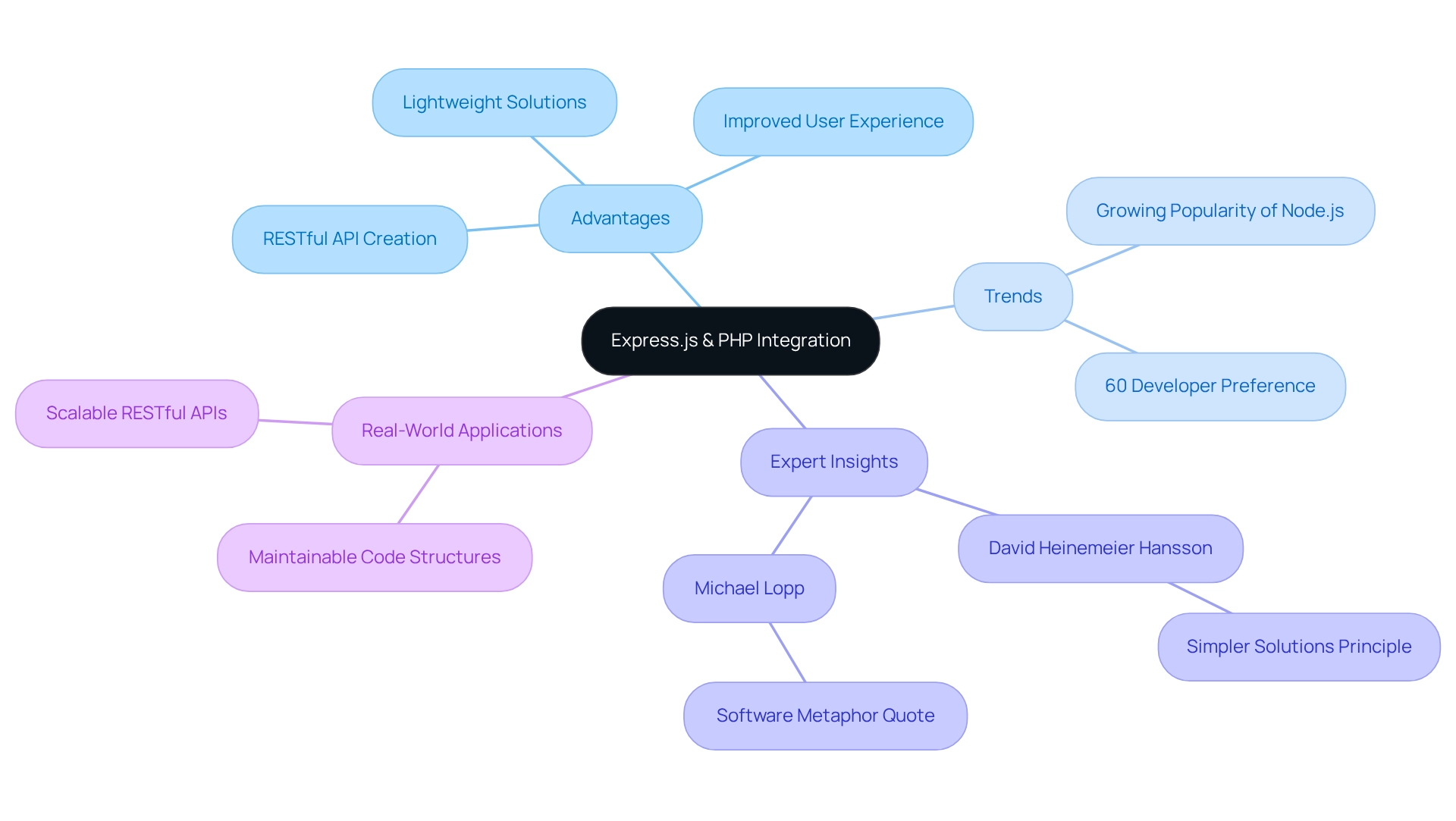
Flask Framework: Exploring Alternatives to PHP for Backend Development
Flask stands out as a micro-framework for Python, emphasizing simplicity and ease of use, making it an ideal choice for developers who want to build lightweight applications quickly. Its minimalistic design allows programmers to include only the necessary components, resulting in a highly customizable framework. Unlike PHP frameworks such as Laravel and Symfony, which come with extensive built-in features, Flask empowers developers to choose libraries and tools that suit their specific project needs. This flexibility makes Flask an appealing option for those seeking a straightforward and efficient backend solution.
Recent updates to Flask have further enhanced its attractiveness, with improvements that streamline the development process and align with modern web standards. Real-world examples of lightweight applications developed with Flask demonstrate its effectiveness in delivering robust solutions without unnecessary complexity. Programmers have successfully utilized Flask to create applications that require agility and minimal overhead, showcasing its versatility across various scenarios.
Statistics reveal that while PHP frameworks like Laravel dominate the landscape, with Laravel holding a significant market share, Flask's customization advantages are increasingly acknowledged. According to JetBrains' 'The State of PHP 2024,' frameworks such as Pest are preferred by 13% of PHP programmers, indicating a growing interest in exploring options like Flask for specific projects. Additionally, the popularity of PHPUnit, favored by 50% of programmers, underscores the importance of testing in PHP projects, providing context for why some developers might consider transitioning to Flask for particular tasks.
Expert insights indicate that Flask's popularity is rising among PHP programmers seeking alternatives, especially for projects that demand agility and minimal overhead. As the backend engineering landscape evolves, Flask continues to gain traction, proving itself as a viable choice for those pursuing efficiency and flexibility in their coding efforts. Moreover, although PHP may not be as adaptable as Python for web scraping, libraries such as Goutte Simple HTML DOM enable programmers to perform web scraping with minimal setup in PHP, illustrating the ongoing relevance of PHP in certain contexts.
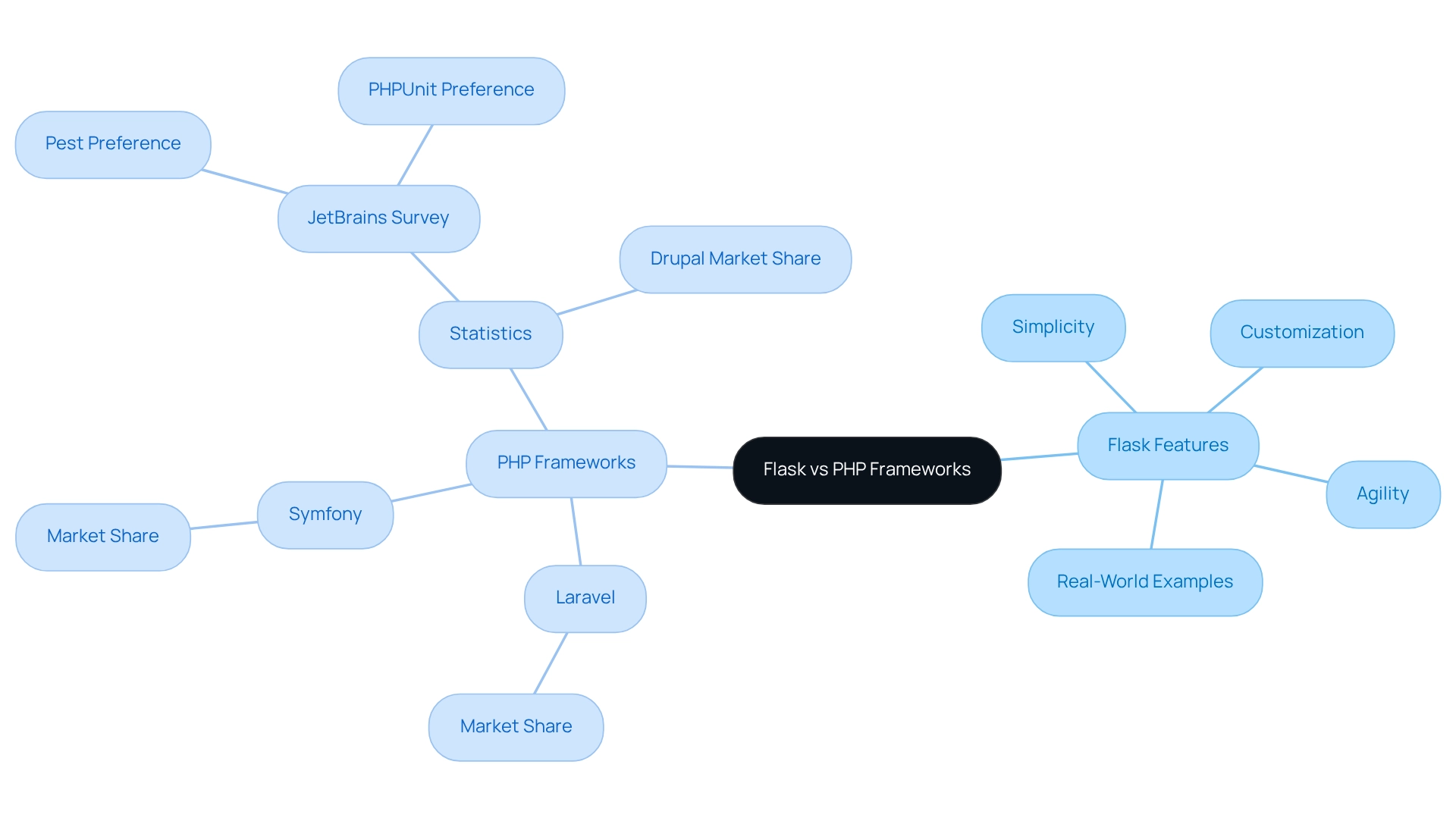
Ruby on Rails: A Fast-Track Approach to Backend Development Compared to PHP
Ruby on Rails is celebrated for its rapid development capabilities and a strong focus on convention over configuration. This framework empowers programmers to create software swiftly by adhering to a set of conventions that simplify the development process. In 2025, statistics reveal that Ruby on Rails adoption remains strong, particularly among startups, as it often necessitates significantly less code to achieve functionality comparable to framework PHP backend. For instance, recent data indicates that Ruby on Rails projects can be completed with up to 30% less code than similar projects using a framework PHP backend, underscoring this efficiency as crucial for projects with tight deadlines. Conversely, PHP frameworks like Laravel and Symfony offer their own advantages, especially regarding extensive community support and seamless integration with existing PHP applications. Many startups have successfully utilized Ruby on Rails for rapid backend development, such as the Latest Casino Bonuses team, which has committed to ongoing support and service improvements post-launch. This dedication has ensured that their platform remains current and secure, providing users with a reliable resource.
The benefits of convention over configuration in Ruby on Rails not only streamline the coding process but also enhance maintainability, allowing programmers to focus on feature development rather than configuration management. Furthermore, Capistrano scripts are vital for managing software processes, server deployments, and database migrations, further bolstering the argument for Ruby on Rails' efficiency. Real-world examples illustrate how startups have flourished using Ruby on Rails, leveraging its speed and efficiency to bring their products to market faster than those relying on a framework php backend. Overall, while both Ruby on Rails and PHP frameworks possess their strengths, the former distinctly excels in accelerating development timelines, making it a compelling choice for developers seeking enhanced efficiency.
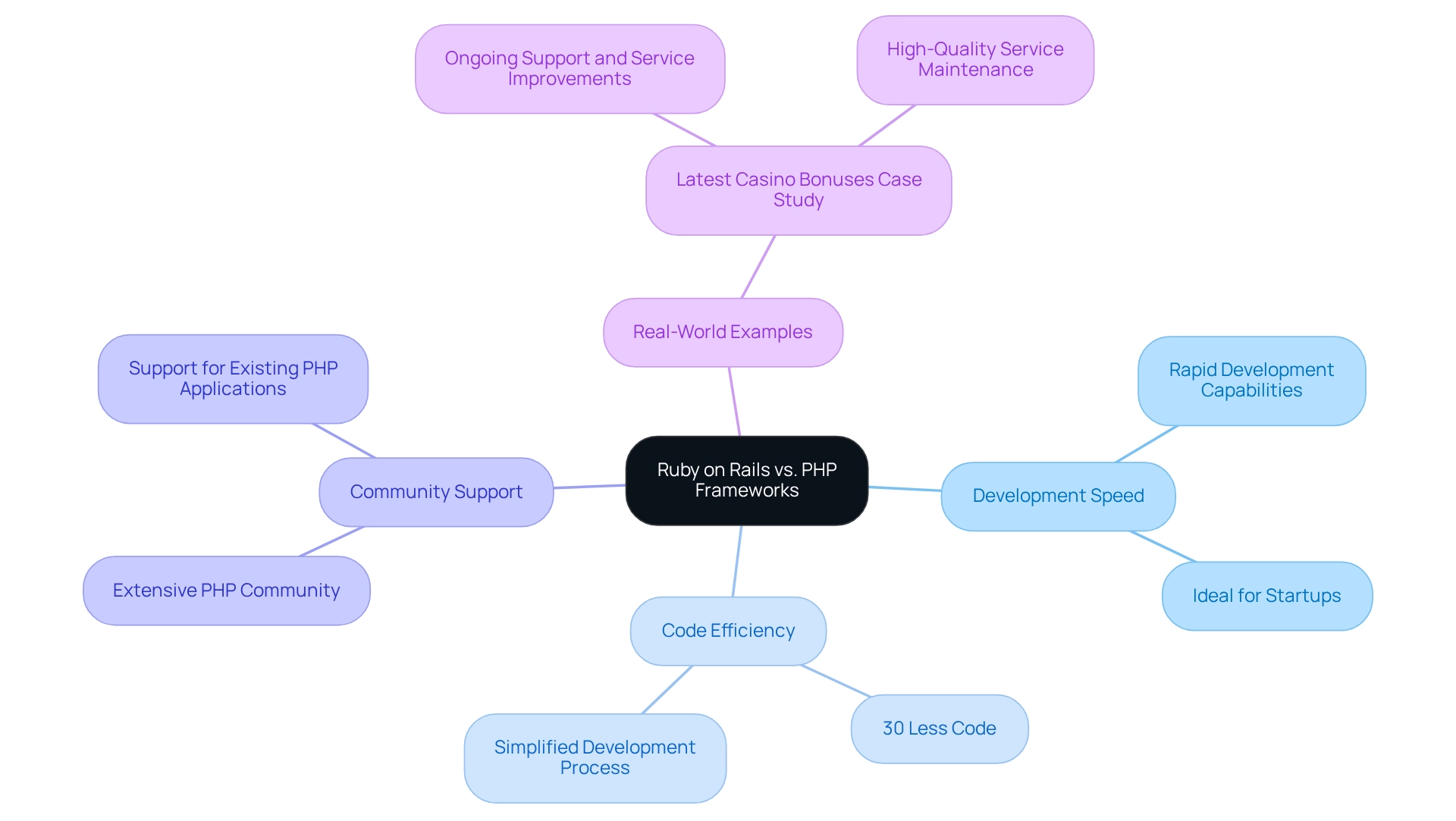
ASP.NET Core: Competing with PHP Frameworks in Enterprise Development
ASP.NET Core stands out as a cross-platform framework developed by Microsoft, designed for crafting modern web solutions with a focus on enterprise-level needs. Its impressive performance, scalability, and security features render it particularly beneficial for large-scale applications. In contrast to ASP.NET Core, the framework PHP backend boasts advantages such as strong typing and a rich ecosystem of libraries and tools, which significantly enhance efficiency in application development. While popular PHP frameworks like Laravel and Symfony serve as excellent options for web creation, the framework PHP backend provided by ASP.NET Core presents a compelling alternative for organizations looking to leverage the .NET ecosystem.
As we look towards 2025, ASP.NET Core's market share in enterprise development continues to rise, showcasing its ability to meet the demands of complex systems. The global digital lending platform market is projected to reach USD 46.4 billion by 2032, signaling a growing need for efficient frameworks in this domain. Numerous practical examples highlight ASP.NET Core's effectiveness; for instance, many companies have successfully implemented it to optimize their production processes and enhance software performance. Additionally, performance benchmarks reveal that ASP.NET Core frequently outperforms the framework PHP backend, especially in managing substantial volumes of requests and data processing.
Case studies underline the importance of assembling a skilled team when transitioning to ASP.NET Core, as this can significantly impact the success of enterprise software. For instance, the case study titled "Budget and Timeline Planning" illustrates that accurately estimating budget and timeline is crucial for developing a loan lending application, facilitating realistic objectives and resource management. By adopting a staged progression strategy, organizations can efficiently manage resources and mitigate risks, ensuring their software delivers value at every stage of development. Furthermore, developers are encouraged to prioritize user-centric features and design to create successful financial software, aligning perfectly with the capabilities of ASP.NET Core.
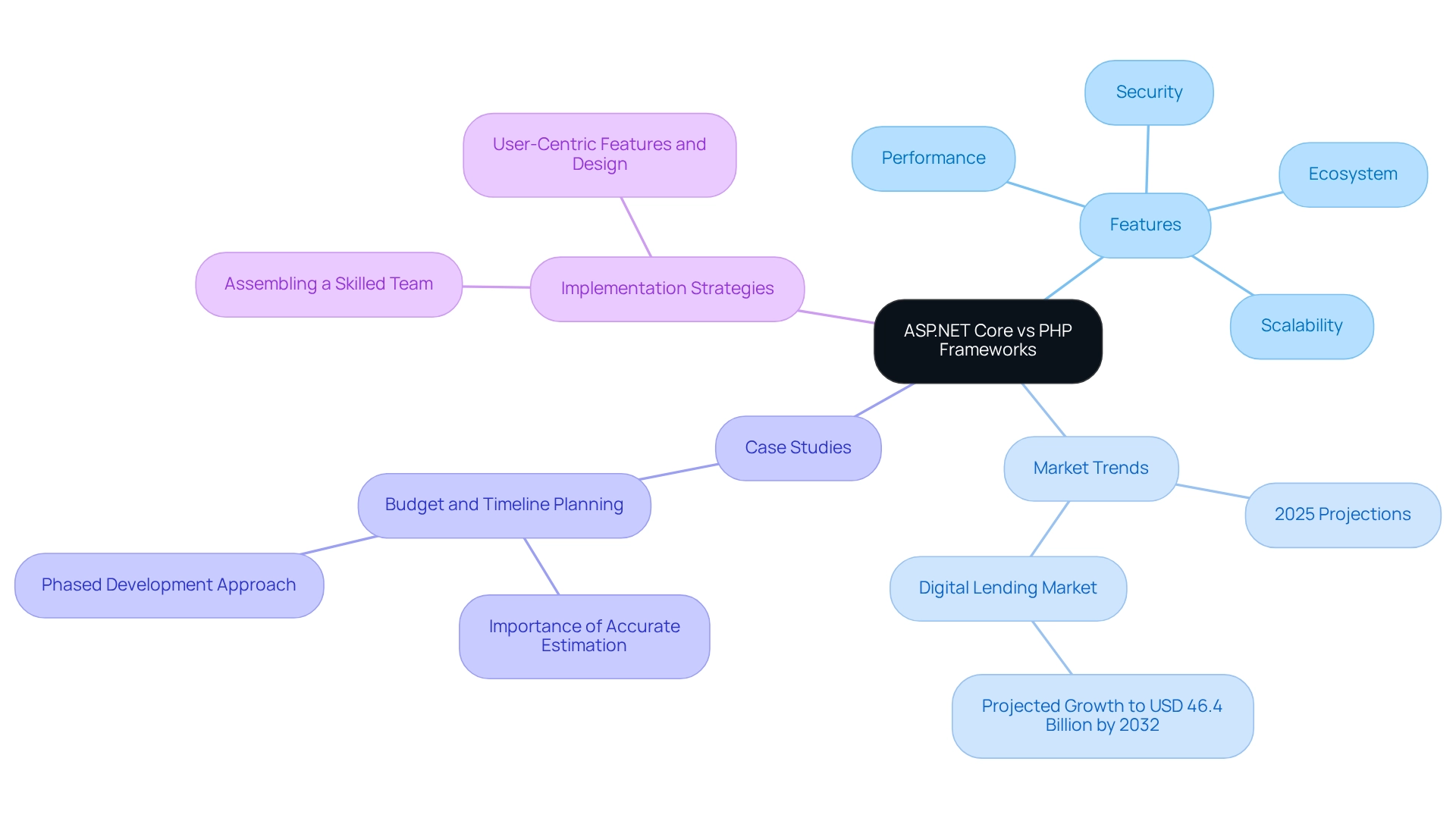
Backend Frameworks for Mobile Development: The Role of PHP in Modern Applications
PHP plays a crucial role in mobile development, particularly in crafting backend services for mobile applications. Frameworks like Laravel and Symfony are exceptional in building RESTful APIs, which are vital for ensuring smooth communication between the frontend and backend of mobile apps. With PHP's strong capabilities in managing server-side logic and database interactions, it serves as an indispensable tool in the mobile application development process. By leveraging the framework php backend, developers can create scalable and efficient backend solutions that greatly enhance mobile software functionality.
Looking ahead to 2025, the significance of PHP in mobile backend development is underscored by the increasing demand for hybrid mobile applications, driven by technological advancements that boost performance. The PHP Foundation's substantial investment of over $600,000 in 2024 highlights the growing commitment to enhancing PHP's capabilities, particularly in mobile contexts, allowing developers to utilize improved tools and resources for their projects.
Real-world case studies illustrate the effectiveness of PHP frameworks in mobile backend design. For instance, a study on hybrid mobile software development shows that integrating native and web software components leads to faster deployment and improved performance, meeting the evolving needs of businesses. Developers have found that creating RESTful APIs with PHP not only streamlines the process but also enhances the overall effectiveness of mobile applications.
As the landscape of mobile development continues to evolve, the framework php backend remains a cornerstone for developers striving to deliver high-quality, efficient backend services. To fully capitalize on the advantages of the framework php backend in mobile backend development, developers should consider incorporating the framework php backend early in the project lifecycle. This approach ensures they can maximize their capabilities to build robust and scalable applications.
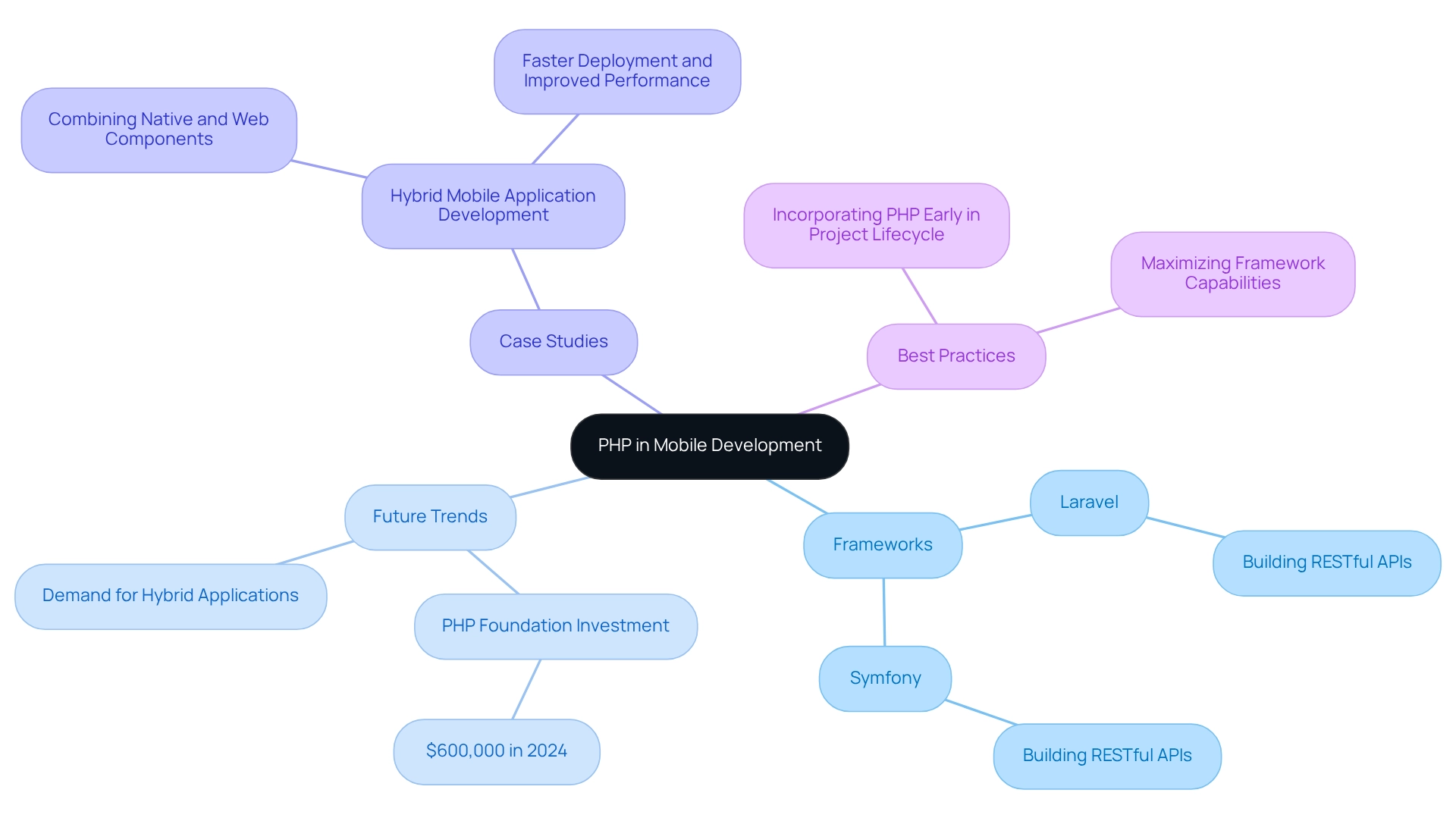
Conclusion
In the realm of backend development, developers often encounter significant challenges that can hinder their productivity. This is where Kodezi steps in, offering automation of API documentation that allows developers to concentrate on coding instead of getting bogged down by administrative tasks. By streamlining backend processes, Kodezi not only enhances productivity but also improves code quality, echoing the strengths of frameworks like Symfony and Laravel, which cater to various project needs while boosting application performance and maintainability.
As the complexities of modern web applications increase, integrating technologies such as Node.js and Express.js becomes essential. These tools not only enhance performance and scalability but also promote seamless communication between front-end and back-end systems. Furthermore, alternatives like Flask and Ruby on Rails present unique advantages for developers who seek lightweight solutions or rapid development capabilities.
Ultimately, the evolution of backend frameworks and tools highlights the necessity for developers to remain informed about the latest trends and technologies. By leveraging these resources, developers can optimize their workflow, foster collaboration, and deliver high-quality applications that meet today’s digital demands. Embracing the capabilities of frameworks and automation tools like Kodezi empowers developers to navigate the challenges of backend development with both confidence and creativity.
Frequently Asked Questions
What challenges do developers face regarding API documentation?
Developers often struggle with managing API documentation, which can be time-consuming and detracts from their coding efforts.
How does Kodezi assist with API documentation?
Kodezi is an OpenAPI Specification generator that automates the API documentation process, allowing programmers to focus more on coding and enhancing productivity.
What percentage of time did coding and programming APIs account for in 2020?
Coding and programming APIs accounted for 29.5% of time allocation for API tasks in 2020.
What advantages does Kodezi provide for programmers working on complex applications?
Kodezi simplifies API integration, resulting in faster creation cycles, improved code quality, and keeps API documentation synchronized with code modifications.
What tools does Kodezi offer to enhance the development process?
Kodezi offers tools such as the Kodezi CLI for automating code reviews, maintaining API documentation, and enhancing security.
Why is Kodezi important in the current market landscape?
The increasing global demand for API management solutions highlights the importance of tools like Kodezi, especially for teams using PHP frameworks.
How does Kodezi improve the flexibility of development?
Kodezi provides smooth code translation features and automatically creates and hosts Swagger UI sites for API documentation and testing.
What is Symfony and how does it benefit PHP development?
Symfony is a powerful PHP framework designed for complex projects, offering modular architecture that enhances performance and adheres to best practices.
What features does Symfony provide to developers?
Symfony includes built-in tools for routing, templating, and security, enabling efficient creation of high-quality applications.
How popular is Symfony among PHP developers?
Over 30% of PHP developers utilize Symfony, indicating its popularity and effectiveness in the PHP ecosystem.
What distinguishes Laravel as a PHP framework?
Laravel features an elegant syntax and expressive API, simplifying tasks such as routing, authentication, and caching, while also providing robust security measures.
How does Kodezi enhance the Laravel experience for developers?
Kodezi offers AI-driven functionalities like automatic code correction and bug analysis, improving workflow efficiency and adaptability for developers using Laravel.
What financial advantages are associated with mastering Laravel?
Professionals with over five years of experience in Laravel can achieve income levels exceeding $120,000, particularly in major cities like San Francisco and London.




